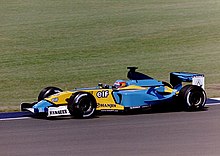Renault R23
This article needs additional citations for verification. (July 2016) |
 | |||||||||||
| Category | Formula One | ||||||||||
|---|---|---|---|---|---|---|---|---|---|---|---|
| Constructor | Renault | ||||||||||
| Designer(s) | Pat Symonds (Executive Engineer) Mike Gascoyne (Technical Director) Bob Bell (Deputy Technical Director) Tim Densham (Chief Designer) Mark Smith (Project Leader) Tad Czapski (Head of R&D) John Iley (Head of Aerodynamics) | ||||||||||
| Predecessor | R202 | ||||||||||
| Successor | R24 | ||||||||||
| Technical specifications | |||||||||||
| Chassis | Moulded carbon fibre and aluminium honeycomb composite monocoque | ||||||||||
| Suspension (front) | Carbon fibre top and bottom wishbones operate an inboard titanium rocker via a pushrod system | ||||||||||
| Suspension (rear) | Titanium top and carbon fibre bottom wishbones operating vertically mounted torsion bars and horizontally-mounted damper units mounted on the top of the gearbox casing | ||||||||||
| Length | 4,600 mm (181 in) | ||||||||||
| Width | 1,800 mm (71 in) | ||||||||||
| Height | 950 mm (37 in) | ||||||||||
| Axle track | 1,450 mm (57 in) on front; 1,400 mm (55 in) on rear | ||||||||||
| Wheelbase | 3,100 mm (122 in) | ||||||||||
| Engine | Renault RS23 3.0 L (183 cu in) V10 111° naturally-aspirated, mid engined, longitudinally-mounted | ||||||||||
| Transmission | Titanium longitudinal, semi-automatic sequential paddle shift, 6-speed + 1 reverse | ||||||||||
| Power | 830–850 hp (619–634 kW) @ 17,800 rpm[1][2] | ||||||||||
| Weight | 600 kg (1,323 lb) including driver and fuel | ||||||||||
| Fuel | Elf | ||||||||||
| Tyres | Michelin | ||||||||||
| Competition history | |||||||||||
| Notable entrants | Mild Seven Renault F1 Team | ||||||||||
| Notable drivers | 7. 8. | ||||||||||
| Debut | 2003 Australian Grand Prix | ||||||||||
| |||||||||||
| Constructors' Championships | 0 | ||||||||||
| Drivers' Championships | 0 | ||||||||||
The Renault R23 is a Formula One car that competed in the 2003 Formula One season. The driver lineup were Jarno Trulli and Fernando Alonso who replaced Jenson Button who left for British American Racing. The chassis was designed by Mike Gascoyne, Bob Bell, Tim Densham and John Iley with Pat Symonds overseeing the design and production of the car as Executive Director of Engineering and Jean-Jacques His leading the engine design. A "B Specification" car named the Renault R23B made its debut at the British Grand Prix and used for the remainder of the 2003 season.
The team started on pole at the 2003 Malaysian Grand Prix, thanks to Alonso. Later the team won the 2003 Hungarian Grand Prix, also thanks to Alonso, the first time Renault had won a Grand Prix since the 1983 Austrian Grand Prix as a full-constructor team and 1997 Luxembourg Grand Prix as an engine supplier after a 97-race wait. Renault was innovative during this period producing non-standard designs such as the 111° 10-cylinder engine for the 2003 RS23 which was designed to effectively lower the center of gravity of the engine and thus improve the car's handling. This eventually proved too unreliable and heavy, so Renault returned to a 72 degree vee angle with the following year's R24.
Eventually the team finished fourth in the Constructors' Championship with 88 points.
Complete Formula One results
(key) (results in bold indicate pole position, results in italics indicate fastest lap)
| Year | Entrant | Chassis | Engine | Tyres | Drivers | 1 | 2 | 3 | 4 | 5 | 6 | 7 | 8 | 9 | 10 | 11 | 12 | 13 | 14 | 15 | 16 | Points | WCC |
|---|---|---|---|---|---|---|---|---|---|---|---|---|---|---|---|---|---|---|---|---|---|---|---|
| 2003 | Renault | R23 | RS23 3.0 V10 | M | AUS | MAL | BRA | SMR | ESP | AUT | MON | CAN | EUR | FRA | GBR | GER | HUN | ITA | USA | JPN | 88 | 4th | |
| 5 | 5 | 8 | 13 | Ret | 8 | 6 | Ret | Ret | Ret | ||||||||||||||
| 7 | 3 | 3 | 6 | 2 | Ret | 5 | 4 | 4 | Ret | ||||||||||||||
| R23B | 6 | 3 | 7 | Ret | 4 | 5 | |||||||||||||||||
| Ret | 4 | 1 | 8 | Ret | Ret |
References
- ^ "Engine Renault". www.statsf1.com. Retrieved 26 November 2020.
- ^ https://www.f1technical.net/forum/viewtopic.php?t=28171
